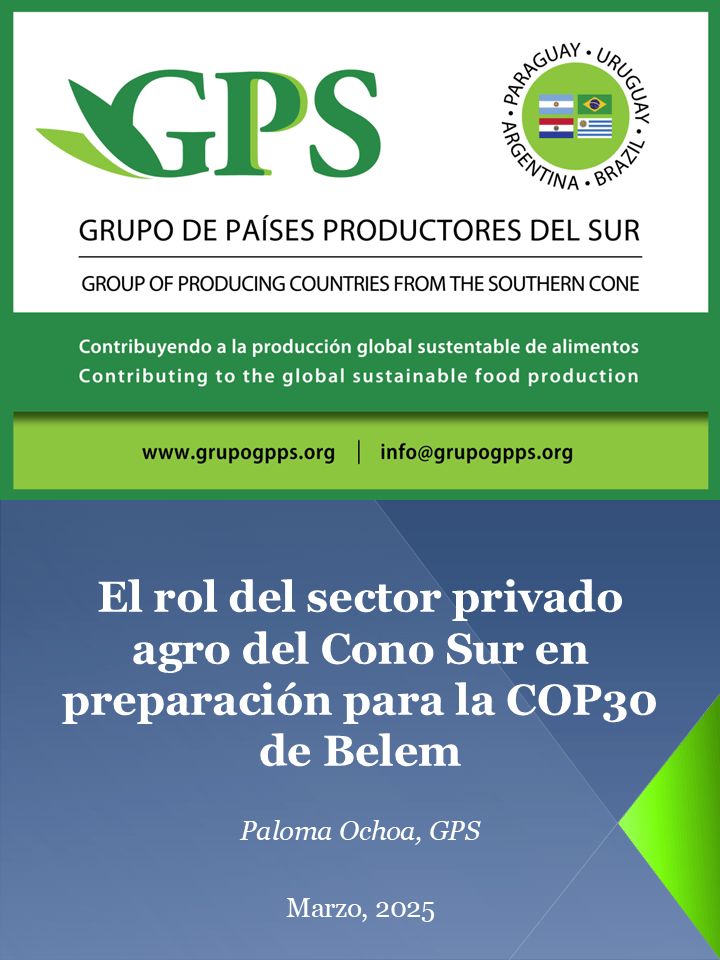November, 2024
The base document analyzes the productive conditions of agriculture in the four countries involved and proposes the role that they can and should play at the global level. The initial narrative can be summarized as follows:
- - Global food security is a central objective, but it is deteriorating in some regions of the world. An effort needs to be made at the global and regional levels to increase agricultural production and productivity in a sustainable way.
- - The global food supply depends substantively on the contributions of the four countries of the Southern Cone (Argentina, Brazil, Paraguay and Uruguay), which have an important role to play in food production and global food security.
- - Food production in the four countries is sustainable and low-carbon as a result of their production techniques.
- It is necessary to strengthen regional integration in agro-industrial production and strengthen ties in trade negotiations.
During the first decade of work, the GPS Network has been consolidating a flexible institutional structure with the participation of a significant number of institutions and people who make it up and has developed an agile and effective operational structure.
The work of the GPS Network has focused on five types of activities:
- - Preparation of documents
- - Organization of information and/or dialogue meetings
- - Collaboration with public and private entities in the formulation of public policies
- - Organization of activities aimed at the development of a more productive and sustainable agro-industrial sector.
- - Works, meetings and dialogues aimed at positioning the region in the promotion and defense of its specific interests in the international arena.
Significant progress has been made in the first three thematic areas, but challenges remain in: a) incorporating a forward-looking vision of the impact of the bioeconomy and emerging technologies on production and international competitiveness, b) promoting the regional integration of MERCOSUR in terms of production and trade, and c) projecting the region in global agro-industrial trade.
On the other hand, the international and regional context is changing rapidly. The main geopolitical changes over the last decade are associated with growing conflict, fragmentation of trade and an increase in the implementation of trade policies that include concepts such as de-risking which, in turn, lead to friendshoring and nearshoring strategies. This has led to a reordering of the productive structure, a return of industrial policies, increasing economic fragmentation, and a weakening of multilateralism and its rules and the increasing imposition of standards (particularly, but not exclusively, environmental).
At the same time, there is a weakening of Mercosur as an export platform, with growing tensions between Argentina and Brazil, greater heterogeneity due to the incorporation of Bolivia and growing disagreement on the part of Uruguay and Paraguay.
Finally, new challenges arise in productive and economic terms due to the emergence of new technologies that modify the production pattern and a better use of resources, generating new opportunities and modifying comparative advantages.
Therefore, although the areas of work that had been postponed should be a natural part of a GPS work plan for the new decade, at the same time, the design of the work plan should incorporate geopolitical, economic and technological trends, which define a new context both within Mercosur and internationally.
Based on this, GPS should emphasize, at the beginning of a new decade, three main thematic areas:
- Expand and adapt agro-industrial production in accordance with the technological opportunities and the productive and commercial realities that develop, as well as their particular demands, with the application of bieconomics as a new productive paradigm.
- Prioritize "soft" integration mechanisms to advance regional integration, which, in the current context, is likely to be complex and difficult. Beyond the institutional weakness of Mercosur, the four countries belong to the same geography and have very important cultural and historical ties. They are a region of peace and are projected to the world as a cultural unit. GPS could collaborate in the promotion, dialogue and organization of institutional mechanisms for linkage and collaboration in the public and private spheres, in coordination with intergovernmental institutions.
- To contribute to a possible and convenient international commercial insertion, supported by the agro-industry-bioeconomy, in an international context with growing political risks, contemplating both joint strategies that contribute to the institutional strengthening of Mercosur, and individual negotiations in specific, limited and novel aspects, which are compatible with the current Mercosur regulations.
Within the framework of the GPS network, joint work should focus on: a) consolidating and deepening the narrative related to the region's production capacity and its qualitative characteristics; (b) identify countries and regions that may be the region's most promising trading partners; c) identify countries with which each of the partners can make progress, individually, on specific issues, without contradicting MERCOSUR regulations; d) contribute to the convergence of environmental standards and certification mechanisms so that they have a regional dimension.
Document available in spanish



